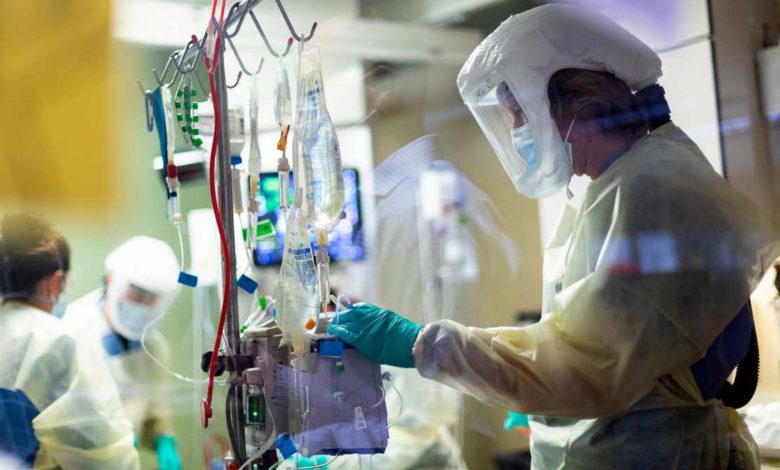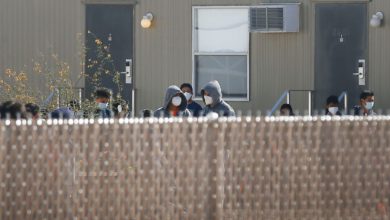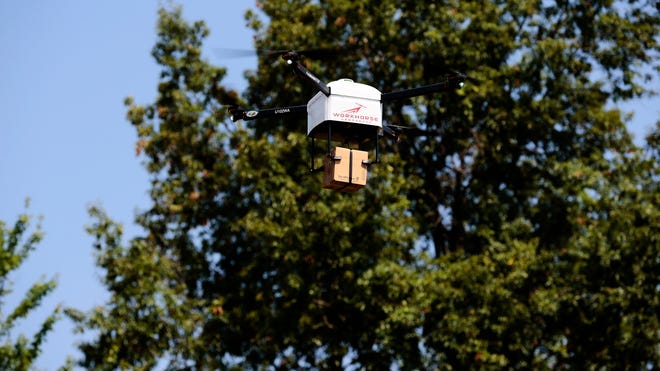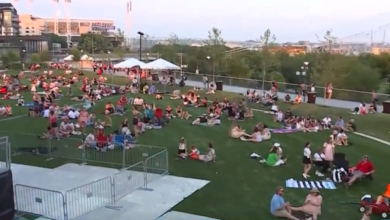

Video above: President Biden urges COVID-19 booster shots when eligibleCOVID-19 is killing so many people in Idaho that some funeral homes are running out of space to store the bodies as coronavirus deaths continue climbing in the U.S."We are working nonstop. We're exhausted. We're frustrated. ... Funeral homes are out of storage. Our hospitals are out of storage. It's just become quite a mess," Dotti Owens, the coroner for Ada County, Idaho, told CNN Saturday.The county bought a mass fatality trailer late last year to accommodate a larger number of bodies, and that has also become near capacity in recent weeks, Owens explained. "Now we're packing them in there. Our internal cooler is full," she said.Idaho has one of the lowest vaccination rates in the U.S., with 41.3% of its total residents fully vaccinated as of Saturday, according to the U.S. Centers for Disease Control and Prevention. The only two states faring worse in fully vaccinating their residents are West Virginia (40.3%) and Wyoming (41%).In Idaho, COVID-19 has killed an average of 20 people a day over the past week, CDC data published Saturday shows.As of Saturday, 90% of Idaho's ICU beds were occupied, with a nationwide high of 58.6% being used by COVID-19 patients, according to data from the U.S. Department of Health and Human Services.Nationally, more than 55% of all U.S. residents were vaccinated as of Saturday, CDC data shows, while 75% of the vaccine-eligible have received at least one dose of inoculation.While the majority of Americans are at least partially vaccinated, COVID-19 deaths reached a seven-day moving average of 1,595 daily deaths as of Friday, according to CDC data.The average rate of COVID-19 deaths in the 10 least vaccinated states was more than four times higher over the past week than the rate in the 10 most vaccinated states, a recent CNN analysis shows.As Idaho struggles with a low vaccination rate and an increasing COVID-19 death toll, some funeral homes are experiencing capacity issues.Steve Salove, a managing partner at Cloverdale Funeral Home in Ada County, said he brought in a refrigeration trailer for the first time since the coronavirus pandemic began because more space is needed, CNN affiliate KIVI reported."Our refrigeration facility here at Cloverdale is substantial, and it's full," Salove told the news outlet.Salove said part of the problem is that many victims' family members are also sick with COVID-19, meaning bodies have to be stored until they recover from the illness and can attend a funeral service. Summers Funeral Home, also in Ada County, told KIVI that it's working on expanding capacity in case deaths continue to mount."Right now, we're okay. But if this continues, we're going to have to make arrangements, and we're in the process of doing that now," said Ken Pearce, the home's Idaho market leader.States grapple with staffing shortagesAs hospitals and funeral homes struggle to keep up with COVID-19's impact in Idaho, a school district has shuttered temporarily after some staff and students tested positive for the virus.The Filer School District (FSD) closed Friday due to "excessive staff absences and the shortage of substitute teachers," district officials said in a Facebook post. Students will not learn remotely during the short recess, which ends Oct. 4."It's hard to say if the absences and shortages have been caused by COVID-19," FSD Superintendent Kelli Schroeder told CNN in an email. "There are several other staff members who are out for illness and other reasons," said Schroeder.The district's COVID-19 dashboard shows 11 school staff and 56 students have tested positive for COVID-19 since school began Sept. 7.A combination of absences among teachers, kitchen staff, custodians and other workers as well as a lack of substitute teachers is making it difficult for the district to operate, Schroeder explained.Meanwhile, Alaska is calling for additional medical staff to be deployed there to help manage COVID-19 cases. The state is seeking 297 registered nurses, 114 nursing assistants and a variety of other technicians and therapists to help hospitals that are struggling with staffing and near capacity. The endeavor will likely cost the state nearly $1 million per day, which will be reimbursed by the federal government, officials said.The new resources come as the state has authorized hospitals to enter Crisis Standards of Care, allowing the facilities to act "in good faith" to ration resources when overwhelmed by patients.Leaders launch vaccine incentive programsIn an effort to improve the vaccination pace in the U.S., state and local leaders are attempting to motivate people by providing some perks.In Ohio, Gov. Mike DeWine launched the "Vax to School" program, which allows eligible residents between ages 12 and 25 to enter with proof of vaccination. The program will give five scholarships worth $100,000 and 50 scholarships worth $10,000. All scholarship money can be used toward any type of education or job training the winner chooses.When announcing the program, DeWine pointed to an "alarming trend" of COVID-19 cases in young people in the state, including 42,000 cases in children between the ages 5 and 17 since school started Aug. 15."Vaccinations remain our ticket out of this pandemic, vaccinations are the way that we stop our hospitals from being overcrowded," DeWine said.In Chicago, Mayor Lori Lightfoot announced a new vaccine campaign this week aimed at getting 77% of all eligible Chicagoans vaccinated. So far, 72.4% of all eligible residents have received at least one dose of a COVID-19 vaccine, she said.Lightfoot stressed the importance of vaccination, saying for unvaccinated Black and Latinx people ages 15 to 60, their probability of death from COVID-19 is 50%."I don't want people playing with their lives," Lightfoot said in a news conference.
Video above: President Biden urges COVID-19 booster shots when eligible
COVID-19 is killing so many people in Idaho that some funeral homes are running out of space to store the bodies as coronavirus deaths continue climbing in the U.S.
"We are working nonstop. We're exhausted. We're frustrated. ... Funeral homes are out of storage. Our hospitals are out of storage. It's just become quite a mess," Dotti Owens, the coroner for Ada County, Idaho, told CNN Saturday.
The county bought a mass fatality trailer late last year to accommodate a larger number of bodies, and that has also become near capacity in recent weeks, Owens explained. "Now we're packing them in there. Our internal cooler is full," she said.
Idaho has one of the lowest vaccination rates in the U.S., with 41.3% of its total residents fully vaccinated as of Saturday, according to the U.S. Centers for Disease Control and Prevention. The only two states faring worse in fully vaccinating their residents are West Virginia (40.3%) and Wyoming (41%).
In Idaho, COVID-19 has killed an average of 20 people a day over the past week, CDC data published Saturday shows.
As of Saturday, 90% of Idaho's ICU beds were occupied, with a nationwide high of 58.6% being used by COVID-19 patients, according to data from the U.S. Department of Health and Human Services.
Nationally, more than 55% of all U.S. residents were vaccinated as of Saturday, CDC data shows, while 75% of the vaccine-eligible have received at least one dose of inoculation.
While the majority of Americans are at least partially vaccinated, COVID-19 deaths reached a seven-day moving average of 1,595 daily deaths as of Friday, according to CDC data.
The average rate of COVID-19 deaths in the 10 least vaccinated states was more than four times higher over the past week than the rate in the 10 most vaccinated states, a recent CNN analysis shows.
As Idaho struggles with a low vaccination rate and an increasing COVID-19 death toll, some funeral homes are experiencing capacity issues.
Steve Salove, a managing partner at Cloverdale Funeral Home in Ada County, said he brought in a refrigeration trailer for the first time since the coronavirus pandemic began because more space is needed, CNN affiliate KIVI reported.
"Our refrigeration facility here at Cloverdale is substantial, and it's full," Salove told the news outlet.
Salove said part of the problem is that many victims' family members are also sick with COVID-19, meaning bodies have to be stored until they recover from the illness and can attend a funeral service.
Summers Funeral Home, also in Ada County, told KIVI that it's working on expanding capacity in case deaths continue to mount.
"Right now, we're okay. But if this continues, we're going to have to make arrangements, and we're in the process of doing that now," said Ken Pearce, the home's Idaho market leader.
States grapple with staffing shortages
As hospitals and funeral homes struggle to keep up with COVID-19's impact in Idaho, a school district has shuttered temporarily after some staff and students tested positive for the virus.
The Filer School District (FSD) closed Friday due to "excessive staff absences and the shortage of substitute teachers," district officials said in a Facebook post. Students will not learn remotely during the short recess, which ends Oct. 4.
"It's hard to say if the absences and shortages have been caused by COVID-19," FSD Superintendent Kelli Schroeder told CNN in an email. "There are several other staff members who are out for illness and other reasons," said Schroeder.
The district's COVID-19 dashboard shows 11 school staff and 56 students have tested positive for COVID-19 since school began Sept. 7.
A combination of absences among teachers, kitchen staff, custodians and other workers as well as a lack of substitute teachers is making it difficult for the district to operate, Schroeder explained.
Meanwhile, Alaska is calling for additional medical staff to be deployed there to help manage COVID-19 cases. The state is seeking 297 registered nurses, 114 nursing assistants and a variety of other technicians and therapists to help hospitals that are struggling with staffing and near capacity. The endeavor will likely cost the state nearly $1 million per day, which will be reimbursed by the federal government, officials said.
The new resources come as the state has authorized hospitals to enter Crisis Standards of Care, allowing the facilities to act "in good faith" to ration resources when overwhelmed by patients.
Leaders launch vaccine incentive programs
In an effort to improve the vaccination pace in the U.S., state and local leaders are attempting to motivate people by providing some perks.
In Ohio, Gov. Mike DeWine launched the "Vax to School" program, which allows eligible residents between ages 12 and 25 to enter with proof of vaccination. The program will give five scholarships worth $100,000 and 50 scholarships worth $10,000. All scholarship money can be used toward any type of education or job training the winner chooses.
When announcing the program, DeWine pointed to an "alarming trend" of COVID-19 cases in young people in the state, including 42,000 cases in children between the ages 5 and 17 since school started Aug. 15.
"Vaccinations remain our ticket out of this pandemic, vaccinations are the way that we stop our hospitals from being overcrowded," DeWine said.
In Chicago, Mayor Lori Lightfoot announced a new vaccine campaign this week aimed at getting 77% of all eligible Chicagoans vaccinated. So far, 72.4% of all eligible residents have received at least one dose of a COVID-19 vaccine, she said.
Lightfoot stressed the importance of vaccination, saying for unvaccinated Black and Latinx people ages 15 to 60, their probability of death from COVID-19 is 50%.
"I don't want people playing with their lives," Lightfoot said in a news conference.
Source link








